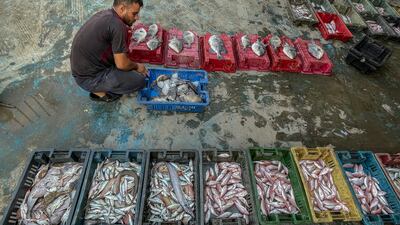Squeezing lemon over chargrilled fish is one of the few pleasures in Gaza, the coastal Palestinian enclave, where even fishing is under constant threat.
At a seafront restaurant, we were dipping flatbread into a spicy-red prawn sauce. All that was left of the white fish were the bones and some flecks of cumin and pepper.
“On days when fish is cheap, everyone eats fish,” said Mohammed Abu Hassira, who emerged from the kitchen to chat about how he had cooked the dish.
The 26-year-old’s family is dedicated to the trade; his father is a fisherman, while his grandfather sells the catch in Gaza.
The vast majority of fishermen in Gaza, 90 per cent according to the World Bank, live below the poverty line.
But with an unemployment rate of 48 per cent, according to the Palestinian Central Bureau of Statistics, there are few alternatives.
While going out to eat fish can be an unaffordable luxury, many Gazans gather at the seafront restaurants for drinks or to smoke shisha.
Sitting a few metres from our table, under wooden awnings hanging over the rocks, a group of women sat on black plastic chairs, playing cards.
Close to them, three others took a selfie with the white-tipped waves in the background.
Metres from the shore, a wooden boat adorned with two Palestinian flags sped past with its passengers delighting in their race across the water.
The nearby port is filled with fishing boats, bobbing in the water, in various stages of disrepair.
The import of materials to Gaza has been severely restricted under an Israel-led blockade imposed since 2007.
As a result, water often needs to be baled out of leaky boats and fishermen say they have to repurpose engines from trucks.
Furthermore, the Israeli military controls the waters and often curbs fishing in response to cross-border violence.
While fishing is currently permitted up to 15 nautical miles from the shore, during the May war it was banned entirely.
“We started to breathe again,” said fisherman Mahdi Abu Ryala, 47, days after a ceasefire ended the conflict. "We used to come to the port and leave the port afraid that we wouldn’t go back to the sea."
While only around 5,500 workers rely on the industry, the Gazan fishermen’s committee says, they support thousands of family members among the population of two million.
“People who live near the sea depend on the fish,” said Mr Abu Hassira, adding that he enjoys explaining the different dishes to customers.
Out at sea, his father and fellow fishermen risk encountering the Israeli navy. About 700 Gazans have been detained since 2006, the fishermen’s committee says, while boats have been confiscated numerous times.
For Gazans who remain on the shore, the sea offers a welcome respite from city streets dotted with the ruins of bombed buildings.
More than three months on from the latest war, tonnes of rubble have been removed to reveal empty spaces littered with twisted rebar.
Some people escape the heat of Gaza city by going swimming, despite the health risks from sewage being regularly disposed into the water.
Many more stay on the sand, sitting under colourful umbrellas or walking along the beach.
While fishermen cast their nets across the Mediterranean, in Gaza the dishes have a unique taste.
“To grill fish isn’t easy at home, so I prefer to eat it out,” said Mustafa Hassouna, 39, sharing our table. “The difference is how we cook it - with spices.”


















